
The Dish’s Weekly Biotechnology News Wrap Up – September 1, 2023
This week’s headlines include: RedShift BioAnalytics’ HaLCon Analyzer Awarded Best of Show at the 15th Annual Bioprocessing Summit, Roche wins first approval for subcutaneous Tecentriq, EU regulators backs Pfizer’s updated vaccine for dominant Omicron subvariant, FTC pauses litigation, mulls settlement as industry rallies around Amgen’s $28B Horizon deal, Danaher Continues M&A Streak, Buying Life Sciences Firm Abcam for $5.7B, Microbiome company Enterome plans $108m raise to fund Phase II cancer trials, and Researchers use ‘epitope editing’ to make CAR-Ts that may target all blood cancers.
Podcasts:
Check out our podcast channel. We have over 100 great podcasts covering drug discovery, stem cell culture, upstream and downstream biomanufacturing and more! Click below to download from iTunes or Google play:
![]()
![]()
In Case You Missed It, Recent Articles on Cell Culture Dish and Downstream Column:
![]()
Accelerate Your Bacterial and Yeast Isolation Workflows with the B.SIGHT™ Microbial Isolation Platform
Single cell bacterial cloning, used to isolate and propagate individual bacterial cells, is an important research tool across a wide  range of scientific disciplines. In microbiome research, the isolation and cultivation of new bacterial species could help uncover new metabolic pathways or regulatory mechanisms that can aid in the development of new therapeutics. In genetics, studying bacterial mutants or strains enables researchers to understand the evolutionary significance of certain genetic modifications. For instance, it can be used to determine resistance mechanisms of antibiotic-resistant bacteria, which can be useful in drug development. Additionally, in biotechnology and industrial sectors, bacterial isolation can be used in strain development to create engineered strains that have desirable traits (i.e., enhanced protein production) for applications like biofuel production, biopharmaceuticals, and bioremediation…
range of scientific disciplines. In microbiome research, the isolation and cultivation of new bacterial species could help uncover new metabolic pathways or regulatory mechanisms that can aid in the development of new therapeutics. In genetics, studying bacterial mutants or strains enables researchers to understand the evolutionary significance of certain genetic modifications. For instance, it can be used to determine resistance mechanisms of antibiotic-resistant bacteria, which can be useful in drug development. Additionally, in biotechnology and industrial sectors, bacterial isolation can be used in strain development to create engineered strains that have desirable traits (i.e., enhanced protein production) for applications like biofuel production, biopharmaceuticals, and bioremediation…
Meeting the Demands of Cell and Gene Therapy Manufacturing with Immunoassays and CYTENA’s C.WASH
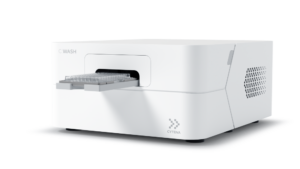 Cell and gene therapy holds immense potential to revolutionize the field of medicine by addressing the root genetic causes of diseases or empowering cells to fight against them. This approach has already achieved remarkable successes in healthcare, including the treatment of rare eye diseases, sickle cell disease, and various cancers. One of the key tools used in cell and gene therapy are viral vectors, which are specialized vehicles that transport genetic material to target cells. Viral vectors have a wide range of applications, from gene therapy to vaccine development. However, before they can be safely used in humans, they must go through a rigorous purification process to eliminate impurities and ensure the safety and efficacy of the final product…
Cell and gene therapy holds immense potential to revolutionize the field of medicine by addressing the root genetic causes of diseases or empowering cells to fight against them. This approach has already achieved remarkable successes in healthcare, including the treatment of rare eye diseases, sickle cell disease, and various cancers. One of the key tools used in cell and gene therapy are viral vectors, which are specialized vehicles that transport genetic material to target cells. Viral vectors have a wide range of applications, from gene therapy to vaccine development. However, before they can be safely used in humans, they must go through a rigorous purification process to eliminate impurities and ensure the safety and efficacy of the final product…Celebrating 10+ Years of Innovation: Thermo Fisher Scientific’s Gibco Expi Protein Expression Systems
We had the privilege of sitting down with Sapna Padmanabhan, Sr. Global Market Development Manager at Thermo Fisher 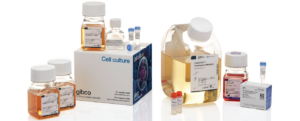 Scientific to talk about the Gibco™ Expi Protein Expression Systems, which have revolutionized protein production for over a decade. These optimized transient expression systems provide a high-performing alternative to conventional stable transfection methods. They enable high-yield, consistent protein production for many downstream applications, driving significant advancements in various research areas, such as biologics development, drug discovery, vaccine development, immunology, gene therapy, immunotherapy, and infectious disease research. During our Q&A session, we will explore the history and significance of these systems, not only in driving innovation in the protein expression space but also in shaping the development of new products at Thermo Fisher Scientific.
Scientific to talk about the Gibco™ Expi Protein Expression Systems, which have revolutionized protein production for over a decade. These optimized transient expression systems provide a high-performing alternative to conventional stable transfection methods. They enable high-yield, consistent protein production for many downstream applications, driving significant advancements in various research areas, such as biologics development, drug discovery, vaccine development, immunology, gene therapy, immunotherapy, and infectious disease research. During our Q&A session, we will explore the history and significance of these systems, not only in driving innovation in the protein expression space but also in shaping the development of new products at Thermo Fisher Scientific.
Key Considerations and Effective Strategies for Oligonucleotide Manufacturing Scale-Up
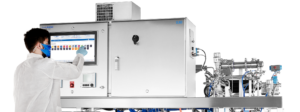 Oligonucleotide therapeutics have emerged as a powerful tool for targeting molecules that are beyond the reach of conventional drugs. With notable progress in nuclei acid chemistry and delivery mechanisms, these therapeutics are revolutionizing the treatment of cancers, genetic disorders and beyond. With a growing number of approved oligonucleotide therapeutics in the US, and many promising candidates in pipeline, oligonucleotides manufacturing will need to shift towards larger-scale processes to keep pace with demand. However, upscaling from benchtop processes presents significant challenges that must be addressed to ensure success…
Oligonucleotide therapeutics have emerged as a powerful tool for targeting molecules that are beyond the reach of conventional drugs. With notable progress in nuclei acid chemistry and delivery mechanisms, these therapeutics are revolutionizing the treatment of cancers, genetic disorders and beyond. With a growing number of approved oligonucleotide therapeutics in the US, and many promising candidates in pipeline, oligonucleotides manufacturing will need to shift towards larger-scale processes to keep pace with demand. However, upscaling from benchtop processes presents significant challenges that must be addressed to ensure success…
Demystifying Cord Blood: Answers to Common Questions from Cell Therapy Developers
Allogeneic cell and gene therapy developers considering cord blood as the source material for their therapy recognize the  advantages it holds—from its naïve state to being cryopreserved and readily available. However, developers often have questions for our team at Be The Match BioTherapies. This article covers common questions about factors such as licensure, characterization, and efficient access to the domestic cord blood supply…
advantages it holds—from its naïve state to being cryopreserved and readily available. However, developers often have questions for our team at Be The Match BioTherapies. This article covers common questions about factors such as licensure, characterization, and efficient access to the domestic cord blood supply…
![]()
Enhance Downstream Bioprocessing Efficiency with AKBA’s Award-Winning MOTIV™ Inline Buffer Formulation (IBF™) Systems
Buffer formulation is an essential part of downstream bioprocessing to produce safe and effective biopharmaceuticals more 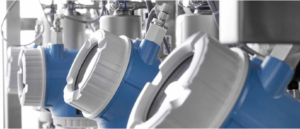 efficiently. Buffers are aqueous solutions with precise pH and ionic strength that can stabilize proteins, aid purification steps, as well as regulate enzymatic activity – and are essential to creating optimal conditions for various biochemical reactions. Specific buffer compositions are required throughout the downstream process, often in volumes that can reach thousands of liters…
efficiently. Buffers are aqueous solutions with precise pH and ionic strength that can stabilize proteins, aid purification steps, as well as regulate enzymatic activity – and are essential to creating optimal conditions for various biochemical reactions. Specific buffer compositions are required throughout the downstream process, often in volumes that can reach thousands of liters…
Cytiva MabSelect™ VL protein L affinity resin
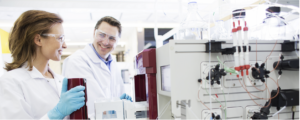 Monoclonal antibodies (mAbs) represent a rapidly growing class of therapeutics designed to target and bind to specific proteins to treat a variety of diseases, including cancer, autoimmune disorders, and infectious diseases. They can be custom engineered to have specific properties that suit specific therapeutic needs, such as increased potency, longer half-life in the body, or reduced immunogenicity. As the field continues to advance, the molecular diversity of mAbs is increasing rapidly, where non-traditional mAb formats such as bispecific antibodies, fragments, and antibody-drug conjugates now account for up to a quarter of projects in the clinical pipeline. Conventional purification protocols relying on protein A may not always be suitable for these novel antibody variants since they may require new ligands or base matrices for effective capture of target molecule and separation of impurities. Therefore, the development of chromatography resins that can accommodate these variants is crucial for manufacturing and process development in the evolving landscape of mAb therapeutics…
Monoclonal antibodies (mAbs) represent a rapidly growing class of therapeutics designed to target and bind to specific proteins to treat a variety of diseases, including cancer, autoimmune disorders, and infectious diseases. They can be custom engineered to have specific properties that suit specific therapeutic needs, such as increased potency, longer half-life in the body, or reduced immunogenicity. As the field continues to advance, the molecular diversity of mAbs is increasing rapidly, where non-traditional mAb formats such as bispecific antibodies, fragments, and antibody-drug conjugates now account for up to a quarter of projects in the clinical pipeline. Conventional purification protocols relying on protein A may not always be suitable for these novel antibody variants since they may require new ligands or base matrices for effective capture of target molecule and separation of impurities. Therefore, the development of chromatography resins that can accommodate these variants is crucial for manufacturing and process development in the evolving landscape of mAb therapeutics…
Cool Tool – GoSilico™ Chromatography Modeling Software from Cytiva
Biopharmaceutical manufacturers are continuously striving to find efficiencies and make improvements across downstream  processing steps to improve product quality, reduce costs, and accelerate the development of safe and effective biopharmaceuticals. Chromatography plays a critical role in the purification of biopharmaceutical products. However, developing chromatography processes can be a challenging task because it involves balancing factors such as selectivity, yield, and productivity while maintaining the purity and quality of the final product. Strategies for process development are evolving and include design of experiments (DoE) and high throughput process development (HTPD). These strategies accelerate process development and increase process understanding, but they require multiple experiments and extensive data analysis, which can be time consuming and resource intensive…
processing steps to improve product quality, reduce costs, and accelerate the development of safe and effective biopharmaceuticals. Chromatography plays a critical role in the purification of biopharmaceutical products. However, developing chromatography processes can be a challenging task because it involves balancing factors such as selectivity, yield, and productivity while maintaining the purity and quality of the final product. Strategies for process development are evolving and include design of experiments (DoE) and high throughput process development (HTPD). These strategies accelerate process development and increase process understanding, but they require multiple experiments and extensive data analysis, which can be time consuming and resource intensive…
Simplified, Closed Slurry Preparation to Manage a Wide Range of Chromatography Media for DAC LC Columns
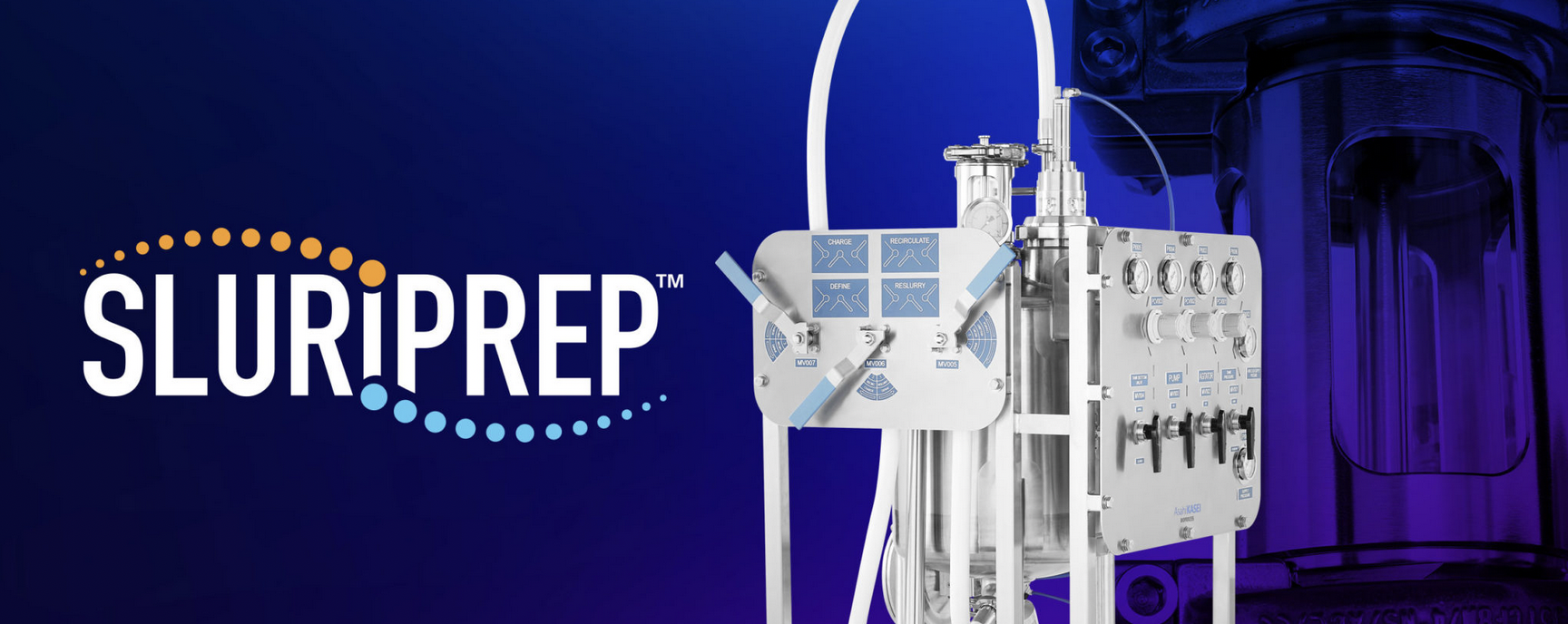
Slurry preparation is a critical step in preparing a well-packed column and achieving a successful bioprocess purification. However, this step can be challenging as different therapeutics require different chromatography media to achieve effective chromatographic separation. For instance, therapeutics in the 5 to 15 kDa range, such as insulins and oligonucleotides utilize rigid and spherical chromatography, which can be more difficult to work with. These media are based on a wide range of matrices including silica gel, polystyrene-divinylbenzene, polymethacrylate, agarose and hydroxyapatite, each with its own packing properties. As these processes are scaled up to larger column diameters, packing media becomes more complex and more crucial for success…
Advanced Single Use Scalable Chromatography System – Delivers 2 Flow Path Sizes in 1 Skid
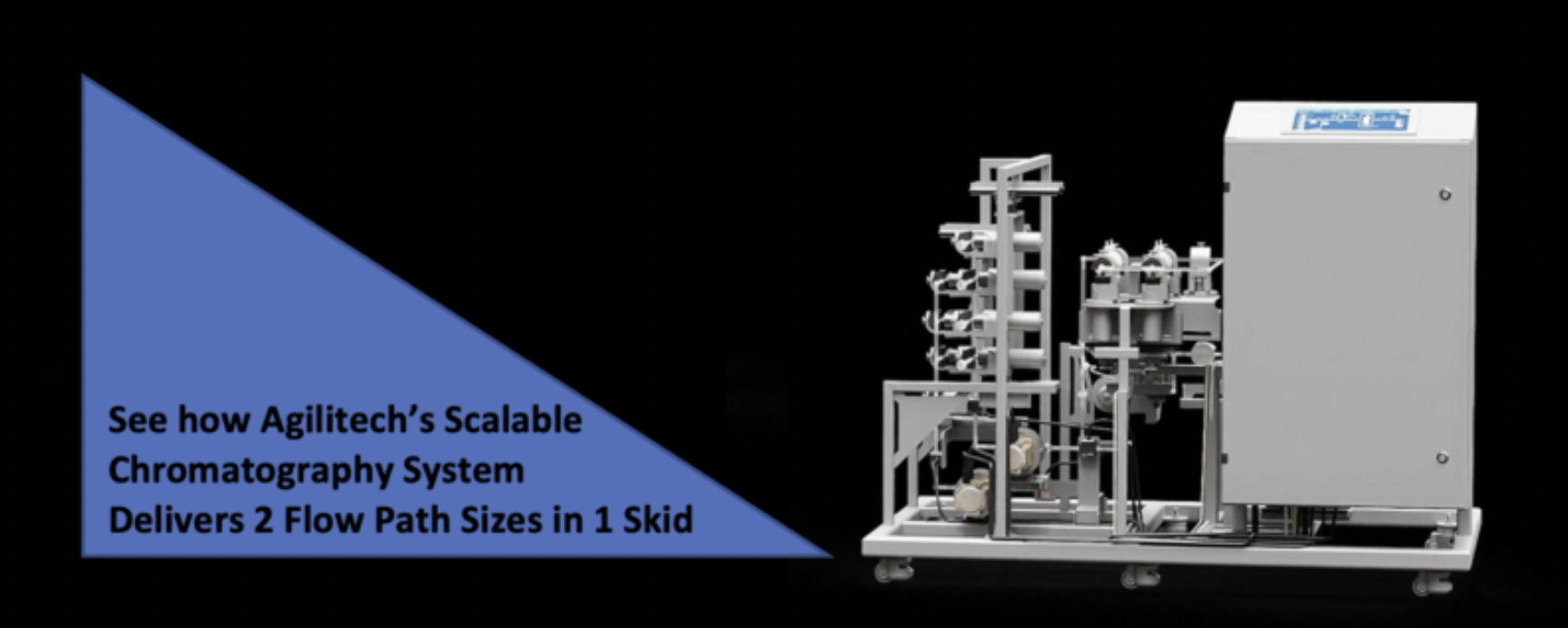
The need for flexibility in bioprocessing is well documented. Changes in demand, multi-product facilities, and technology advancements are just some of the reasons bioprocessing volumes may increase or decrease. Since, it is not time or cost effective to procure, configure, and qualify new equipment to meet changing requirements, equipment that supports process flexibility is advantageous…
New Technology Solutions for Lentiviral Vector Clarification
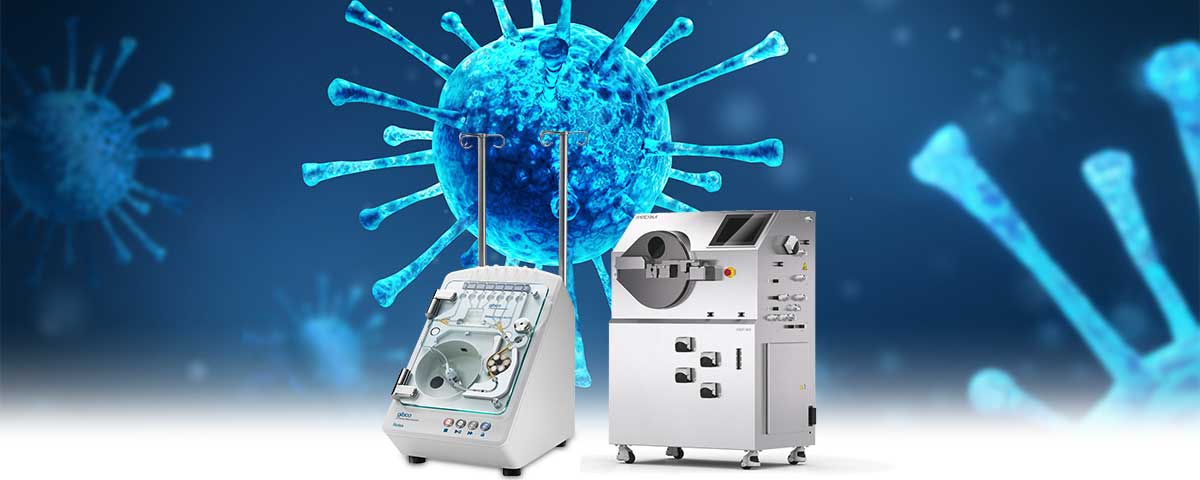 The growth of the cell and gene therapy sector, and the growing number of gene and gene-modified cell therapies entering the market has translated into an increased global demand for lentiviral vectors (LVs) as a gene delivery tool. There are currently two FDA approved LV-based cell and gene therapy products—Kymriah® (Novartis) and ZYNTHEGLO® (bluebird bio), and according to the Alliance for Regenerative Medicine, an estimated 48% of the ongoing cell and gene therapy clinical trials use lentiviral vectors, with a significant number in late-stage evaluation. The strong pipeline of LV-mediated gene and CAR-T cell therapy products headed towards market approval means the development of efficient LV vector purification methods to improve yield and recovery is needed to meet the growing demand while also driving down the cost of production…
The growth of the cell and gene therapy sector, and the growing number of gene and gene-modified cell therapies entering the market has translated into an increased global demand for lentiviral vectors (LVs) as a gene delivery tool. There are currently two FDA approved LV-based cell and gene therapy products—Kymriah® (Novartis) and ZYNTHEGLO® (bluebird bio), and according to the Alliance for Regenerative Medicine, an estimated 48% of the ongoing cell and gene therapy clinical trials use lentiviral vectors, with a significant number in late-stage evaluation. The strong pipeline of LV-mediated gene and CAR-T cell therapy products headed towards market approval means the development of efficient LV vector purification methods to improve yield and recovery is needed to meet the growing demand while also driving down the cost of production…
eBook:
Purification of antibody therapeutics – DOWNLOAD EBOOK
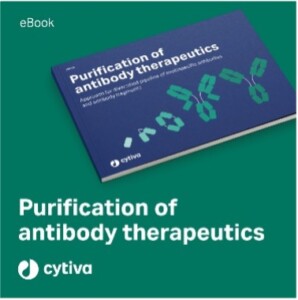 Approach for diversified pipeline of multispecific antibodies and antibody fragments
Approach for diversified pipeline of multispecific antibodies and antibody fragments
Antibody therapeutics are the largest class of biotherapeutics, and their development has been ongoing for decades. Over the years, development beyond traditional monoclonal antibodies (mAb) has increased, like multispecific and bispecific antibodies, antibody fragments, and antibody drug conjugates.
Manufacturing platform approaches conveniently used for many traditional mAbs are being adopted or tweaked to fit the respective molecule.
In the eBook Purification of antibody therapeutics, you will learn about considerations and tips for developing purification protocols for antibody variants.
eLearning Opportunity:
DESIGN OF EXPERIMENTS (DOE) FOR CHROMATOGRAPHY – TakE FREE E-LEARNING COURSES
Improve process development efficiency compared to studying one factor at a time (OFAT)
A Design of Experiments (DoE) model can be used to understand how experimental parameters affect outcomes. In 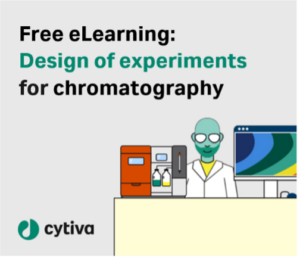 chromatography process development, a DoE approach can greatly improve the efficiency in screening for suitable experimental conditions, in optimizing a process, or in robustness testing.
chromatography process development, a DoE approach can greatly improve the efficiency in screening for suitable experimental conditions, in optimizing a process, or in robustness testing.
What is DoE?
Design of experiments (DoE) is a technique for planning experiments and analyzing the information obtained. The technique allows you to use a minimum number of experiments. You systematically vary several experimental parameters simultaneously to obtain sufficient information to create a mathematical model of the chromatography process.
Take one of the DoE eLearning courses from Cytiva
Explore the basic concepts of DoE, learn about the typical workflow, and get guidance on graph interpretation in the first course. Then see how to perform a DoE screening with UNICORN™ software to optimize conditions for high yield and protein purity.
Headlines:
“RedShift BioAnalytics’ HaLCon Analyzer Awarded Best of Show at the 15th Annual Bioprocessing Summit,” News Release
RedShift BioAnalytics (RedShiftBioⓇ) celebrates HaLCon as having been selected as the Best of Show award recipient earlier this month at the CHI Bioprocessing Summit in Boston, MA. The Best of Show Award provides exhibitors of the Bioprocessing Summit the opportunity to showcase newly launched products which can include new applications, technologies, or instrumentation. During the course of the event, over 1,500 Bioprocessing Summit attendees were invited to cast their votes for their choice of the most impactful new products of the year and HaLCon took home the prize…
“Roche wins first approval for subcutaneous Tecentriq,” Pharmaceutical Technology
Roche has beaten competitors to score approval for the subcutaneous (SC) formulation of its blockbuster oncology drug, Tecentriq (atezolizumab). Tecentriq SC was approved by the UK’s Medicines and Healthcare products Regulatory Agency (MHRA) for use in all the indications previously approved for the intravenous formulation. It will be available for patient use through the National Health Service (NHS). Tecentriq SC is currently under assessment by the US Food and Drug Administration (FDA), the European Medicines Agency (EMA), and other regulatory bodies…
“EU regulators backs Pfizer’s updated vaccine for dominant Omicron subvariant,” Reuters
EU regulators have recommended authorizing an updated COVID-19 vaccine from Pfizer (PFE.N) and its German partner BioNTech (22UAy.DE) which targets the dominant XBB.1.5 variant of Omicron, putting it on track to become the third adapted shot by the two companies to be approved in the bloc. The vaccine, dubbed Comirnaty, is to be used for preventing COVID-19 in adults and children with a dosage dependent on previous vaccinations…
“FTC pauses litigation, mulls settlement as industry rallies around Amgen’s $28B Horizon deal,” FiercePharma
After filing a closely watched lawsuit to block Amgen’s proposed takeover of Horizon Therapeutics, the Federal Trade Commission (FTC) is pausing those efforts to consider whether it should settle the case. The agency has suspended internal legal proceedings to block the Amgen-Horizon deal, a court filing (PDF) shows. The halt is in place until Sept. 18 for the FTC to consider “the proper resolution of this matter”…
“Danaher Continues M&A Streak, Buying Life Sciences Firm Abcam for $5.7B,”
Abcam’s acquisition comes two months after its board announced the exploration of strategic alternatives that could include the sale of the company. Danaher beat out at least 20 companies that were potential buyers of the life sciences tools and antibody development firm…
“Microbiome company Enterome plans $108m raise to fund Phase II cancer trials,” Pharmaceutical Technology
Enterome is planning to raise EUR100m ($108m) as part of its latest fundraising round to power its clinical studies, said CEO Pierre Belichard in an interview with Pharmaceutical Technology. The company has already started speaking to investors in Europe and plans to start contacting those in the US in early September, he said. The funding will go towards the company’s clinical trials, which include two new Phase II studies, said Belichard. Enterome’s E02463 is an off-the-shelf immunotherapy that is made of four bacterial peptides of B lymphocyte-specific lineage markers. These peptides are based on the company’s OncoMimics approach, which uses specific peptide combinations derived from bacteria in the gut microbiome…
“Researchers use ‘epitope editing’ to make CAR-Ts that may target all blood cancers,” FierceBiotech
CAR-T cell therapies have been heralded as a game changer for blood cancers, but those therapies approved so far have been focused on a few subtypes of leukemia, lymphoma and myeloma. Now, a new strategy that leverages CRISPR to create CAR-Ts that target a ubiquitous antigen has shown potential to treat all forms of the three hematological diseases. In an article published Aug. 31 in Science Translational Medicine, a research team from the University of Pennsylvania’s Perelman School of Medicine—co-led by CAR-T pioneer Carl June, M.D.—described how it developed CAR-T cells that target CD45, a protein found on the surface of nearly all blood cancer cells. A proof-of-concept study in cell cultures and mouse models showed that the anti-CD45 CAR-Ts could eliminate acute myeloid leukemia (AML) cells within three weeks…